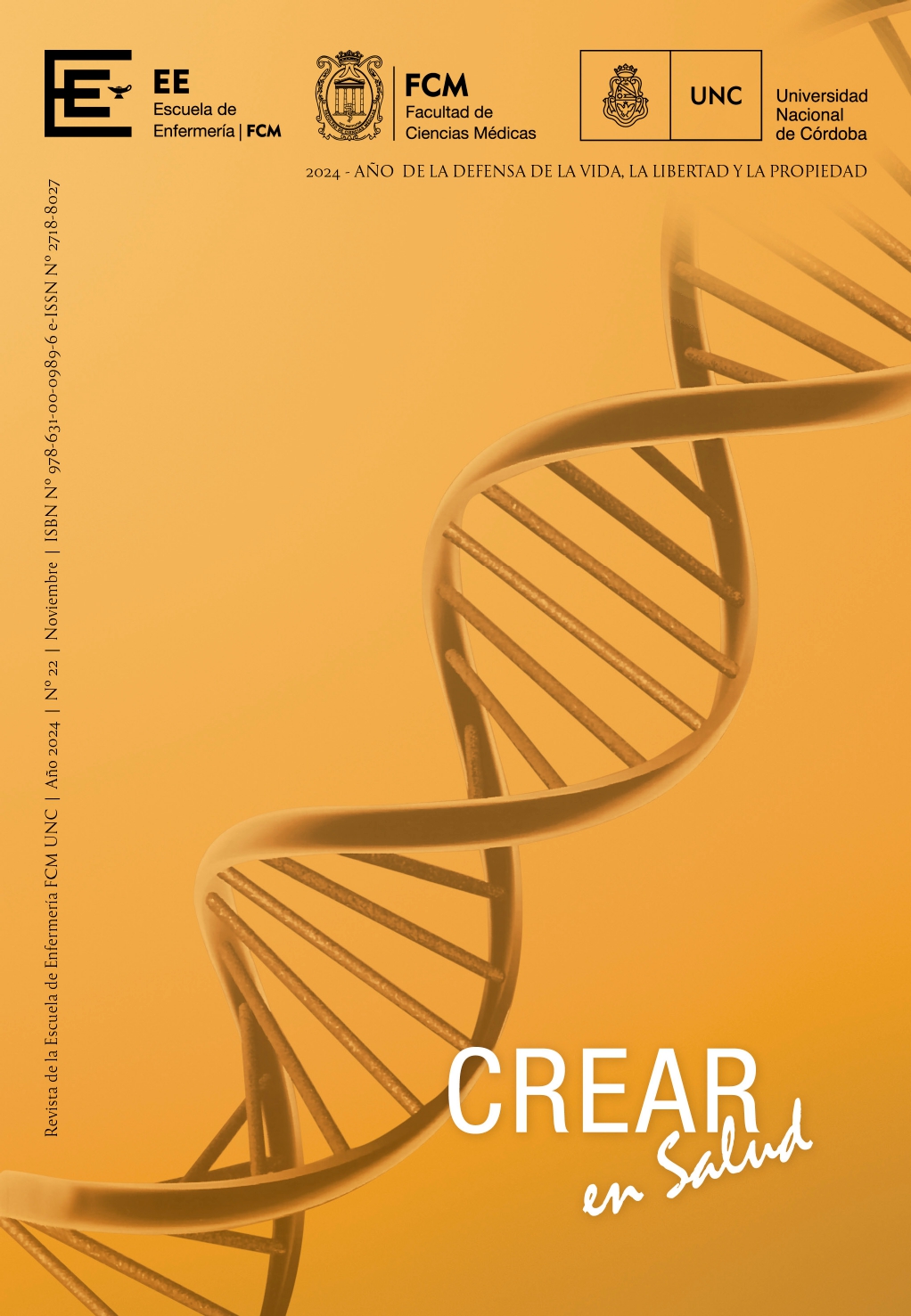Nurses’ experiences in supporting families during a pediatric cancer diagnosis
Keywords:
Oncology; pediatrics; nursing; adaptation; nursing role; family.Abstract
Introduction: Cancer is a global public health issue. In Argentina, approximately 1,400 cases of pediatric cancer are diagnosed each year in children under 15. The role of nursing in pediatrics focuses on family-centered care, where children constantly need their families, and families need them to navigate and overcome the disease together. The professional nurse provides emotional support, love, and affection, practicing empathy to understand both the patient and their family, while encouraging the creation of a support network. Objective: To understand the experiences of nurses in supporting families faced with a pediatric cancer diagnosis. Methodology: The research followed a qualitative, phenomenological, and interpretative design. This study was conducted with nurses from the pediatrics department of a private healthcare institution, from May to August 2022. The results were derived from the saturation of data gathered through open-ended interviews, as well as field notes and voice recordings. Participants provided signed informed consent. Results: The findings aligned with the objectives set. Findings: Sadness and helplessness felt by nursing professionals when faced with a pediatric cancer diagnosis, limitations in emotional self-control when empathizing with others, and indifference perceived in interdisciplinary communication. Conclusion: This study allowed us to understand the nursing staff working in pediatric services with pediatric cancer diagnoses, who are exposed to situations where they employ coping mechanisms, such as dealing with the possibility of a child’s early death. Additionally, it highlighted the emotional burden generated in both the care provided and the support given to families when faced with the diagnosis.
References
Alligood, M. R. (2023). Modelos y teorías en enfermería. Elsevier Health Sciences. CAP - 17. Sor Callista Roy: Modelo de adaptación, p. 335.
Campiño Valderrama, S. M. et al (2016). Afrontamiento y adaptación de cuida- dores de niños y niñas con cáncer. Revista Universidad y Salud, 18(2), 302-
311. http://www.scielo.org.co/scielo.php?script=sci_arttext&pid=S0124- 71072016000200011&lng=es&tlng=es.
Cardona Torres L. M, et al. (2010). La empatía, un sentimiento necesario en la relación Enfermera-Paciente. Desarrollo Científica Enfermería, 18(3). http://www.index-f.com/dce/18pdf/18-120.pdf
Carpena, A. (2016). La empatía es posible. Editorial Desclée de Brouwer. Corbella, J. (1994). Tristezas y depresión. Ediciones Folio.
Damasio, A. R. et al. (2016). Sentir lo que sucede: Cuerpo y emoción en la fábrica de la consciencia.
https://issuu.com/fernandopennar./docs/anto- nio_damasio_-_sentir_lo_que_suc
De Vargas, R. (2021). Las emociones en enfermería una mirada desde el cuidado humano. Revista CIEG - Centro de Investigación y Estudios Gerenciales (52), 146-161. https://revista.grupocieg.org/wp-content/ uploads/2021/11/Ed.52146-161-Rengifo-Yuli.pdf
Henao, L. F. y Martínez, S. L. (2019). Situación actual del cáncer infantil en el mundo. http://hdl.handle.net/10554/43278.
Instituto Nacional del Cáncer. Ministerio de Salud y Desarrollo Social, Pre- sidencia de la Nación. (2018) ¿Cuándo sospechar cáncer en el niño? http://www.msal.gob.ar/images/stories/bes/graficos/0000000029cnt- 2018-cuando_sospechar_cancer_en_el_nino.pdf
Elers Mastrapa, Y, y Gibert Lamadrid, M. P. (2016). Relación enfermera pa- ciente: una perspectiva desde las teorías de las relaciones interperso- nales. Revista Cubana de Enfermería, 32(4) http://scielo.sld.cu/scielo. php?script=sci_arttext&pid=S0864-03192016000400019&lng=es&tlng=pt.
Martínez, A. C., y Bouquet, R. I. (2007). Tristeza, depresión y estrategias de autorregulación en niños. Revista Tesis Psicológica, (2), 35-47. https:// www.redalyc.org/pdf/1390/139012670004.pdf
Neris, R. R., et al. (2021). Sobrevivência ao câncer infantojuvenil: reflexões emergentes à enfermagem em oncologia pediátrica. Revista da Es- cola de Enfermagem da U S P, 55. https://doi.org/10.1590/s1980- 220x2020041803761
Organización Panamericana de la Salud. (2014). Early Diagnosis of Childhood Cancer. https://iris.paho.org/handle/10665.2/34850
Ramírez, P., et al. (2015). Relaciones personales entre la enfermera y el pa- ciente. Revista, Enfermería Universitaria, 12(3), 134-143. https://doi. org/10.1016/j.reu.2015.07.004
Rengifo de Vargas, Y. (2021). Las emociones en enfermería: una mirada desde el cuidado humano. Revista, CEIG (Centro de Investigación y estudios gerenciales), (52), 146-161. https://revista.grupocieg.org/wp-content/ uploads/2021/11/Ed.52146-161-Rengifo-Yuli.pdf
Rosado Pérez, G., & Varas-Díaz, N. (2019). Experiencias y Proceso de due- lo entre profesionales de enfermería oncológica pediátrica: Experiences and grieving process among pediatric cancer nurses. Revista Puertorri- quena de psicologia, 30(2), 290. https://www.ncbi.nlm.nih.gov/pmc/arti- cles/PMC7195809/
Tamayo Giraldo, A. et al (2017). El juego como mediación pedagógica en la comunidad de una institución de protección, una experiencia llena de sentido. Revista Latinoamericana de Estudios Educativos, (13)1, 105-
Downloads
Published
Issue
Section
License
Copyright (c) 2024 Crear en Salud

This work is licensed under a Creative Commons Attribution-NonCommercial 4.0 International License.



